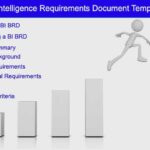The Best Fluffy Pancakes recipe you will fall in love with. Full of tips and tricks to help you make the best pancakes.
The Future of Business Intelligence
Business intelligence (BI) is a process that involves collecting, analysing, and transforming data into meaningful insights to aid in decision-making. With the growing complexity of business operations, BI has become an essential tool for businesses to improve their operational efficiency, make informed decisions, and gain a competitive edge. As technology continues to evolve, the future of BI is poised to be even more revolutionary.
The Importance of Business Intelligence
Business intelligence is crucial in the current digital age, where businesses generate and process vast amounts of data. BI enables businesses to identify trends and patterns in data, leading to insights that aid in decision-making. BI also helps businesses to streamline their operations, reducing costs and improving efficiency. Additionally, BI allows businesses to gain a competitive edge by enabling them to make data-driven decisions that optimise their performance.

The Current State of Business Intelligence
BI Trends
BI trends are constantly evolving, with new technologies and innovations emerging regularly. Current BI trends include:
Augmented Analytics
Augmented analytics involves the use of AI and machine learning algorithms to automate data analysis, making it faster and more accurate.
Data Democratization
Data democratization involves making data accessible to all users in a business, regardless of their technical skills, by using tools like data visualization and self-service analytics.
Predictive Analytics
Predictive analytics uses statistical models and machine learning algorithms to predict future outcomes based on historical data.
BI Tools and Technologies
Numerous tools and technologies are used in BI, including:
Data Warehouses
Data warehouses are used to store data from different sources, making it easier to analyse and transform data.
Data Visualization Tools
Data visualization tools enable users to represent data visually, making it easier to understand and interpret.
Cloud-based BI
Cloud-based BI allows businesses to store and process data in the cloud, reducing infrastructure costs and increasing scalability.
Challenges Faced by BI
Despite the numerous benefits of BI, it also poses several challenges. These include:
Data Quality
Data quality is critical in BI, and poor-quality data can lead to incorrect insights and decisions.
Data Security
As businesses handle sensitive data, data security is essential in BI. A data breach can lead to significant financial and reputational damage.
Integration
Integrating data from different sources can be challenging, and it requires expertise and resources.
The Future of Business Intelligence
The future of BI is poised to be even more transformative, with several emerging trends that are set to shape the industry.
BI as a Service (BIaaS)
BI as a service involves the delivery of BI services through the cloud, making it more accessible and cost-effective for businesses of all sizes. BIaaS also provides scalability, allowing businesses to scale their BI operations according to their needs.
AI-powered BI
AI-powered BI involves the use of machine learning algorithms to automate data analysis, reducing the time and
increasing the accuracy of insights. AI-powered BI also enables businesses to identify patterns and trends in data that may not be apparent to humans.
Increased BI Adoption
As businesses become increasingly data-driven, the adoption of BI is set to increase. BI is no longer limited to large enterprises, and small and medium-sized businesses are also adopting BI to gain a competitive advantage.
BI and IoT
The Internet of Things (IoT) involves the interconnectivity of devices and sensors, generating vast amounts of data. BI can be used to analyse this data, leading to insights that can improve business operations and customer engagement.
Data Democratization
Data democratization is set to become even more prevalent, enabling businesses to make data-driven decisions faster and more efficiently. Self-service analytics and data visualization tools will become more advanced, making it easier for non-technical users to access and interpret data.
Impact of BI on Businesses
The impact of BI on businesses is far-reaching, with several benefits that include:
Improving Operational Efficiency
BI can be used to identify inefficiencies in business operations, enabling businesses to optimise their processes and reduce costs.
Enhanced Decision-Making
BI provides businesses with accurate and timely insights, enabling them to make informed decisions that drive growth and profitability.
Better Customer Engagement
BI enables businesses to understand their customers better, leading to more personalised and engaging customer experiences.
Competitive Advantage
BI enables businesses to gain a competitive advantage by providing them with insights that can improve their products, services, and overall performance.
Conclusion
In conclusion, the future of BI is set to be even more transformative, with emerging technologies and trends that will shape the industry. BI is an essential tool for businesses of all sizes, enabling them to improve their operational efficiency, make informed decisions, and gain a competitive advantage. As technology continues to evolve, the importance of BI is set to increase, making it an exciting time for businesses looking to leverage data-driven insights to succeed.
FAQs
- What is Business Intelligence, and why is it essential?
- What are some of the challenges faced by businesses in implementing BI?
- How is BI set to evolve in the future?
- What are some of the benefits of BI to businesses?
- Can small and medium-sized businesses benefit from BI?



